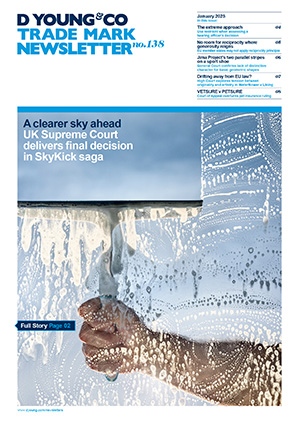Admissibility of new evidence on appeals from registrar
In Consolidated Developments v Cooper, the England and Wales High Court has given guidance on when fresh evidence can be adduced on appeal from the Registrar at the UK Intellectual Property Office.
Mr Cooper was the owner of four UK trade marks for TIN PAN ALLEY. On 26 September 2016, Consolidated Developments applied to the UK Intellectual Property Office (UKIPO) to revoke the marks for non-use. A hearing was not requested and the hearing officer, Mr Allan James, revoked all of the marks except for one in respect of certain services in class 35.
Mr Cooper subsequently appealed the hearing officer's decision. In doing so he sought to introduce additional evidence that was not before the hearing officer, reasoning that had the hearing officer seen the evidence, he would have found that the marks had been used for a much wider range of goods and services.
Appeals from the hearing officer are in the norm to the appointed person (although one can elect to appeal to the England and Wales High Court). However, in this instance, the appointed person, Mr Hobbs QC, referred the matter to the England and Wales High Court, explaining that the appeal raised issues of general legal importance. In doing so, he posed certain questions to the court regarding the scope of appeals.
Pursuant to section 76(1) of the Trade Marks Act 1994 "[a]n appeal lies from any decision of the registrar under this Act ... For this purpose "decision" includes any act of the registrar in exercise of a discretion vested in him by or under this Act."
Consolidated Developments argued that Mr Cooper’s appeal did not challenge any decision of the hearing officer; rather Mr Cooper accepted that he was correct on the evidence before him. The judge, Mr Justice Carr, considered the authorities and concluded as follows:
“The cases to which I have referred establish the following principles in respect of the admissibility of fresh evidence in trade mark appeals, sought to be introduced for the first time on appeal:
i) the same principles apply in trade mark appeals as in any other appeal under CPR part 52. However, given the nature of such appeals, additional factors may be relevant;
ii) the Ladd v Marshall factors are basic to the exercise of the discretion, which are to be applied in the light of the overriding objective;
iii) it is useful to have regard to the Hunt-Wesson factors;
iv) relevant factors will vary, depending on the circumstances of each case. Neither the Ladd v Marshall factors nor the Hunt-Wesson factors are to be regarded as a straightjacket;
v) the admission of fresh evidence on appeal is the exception and not the rule;
vi) the Gucci decision does not establish that the Court or the Appointed Person should exercise a broad remedial discretion to admit fresh evidence on appeal so as to enable the appellant to re-open proceedings in the Registry; and
vii) where the admission of fresh evidence on appeal would require that the case be remitted for a rehearing at first instance, the interests of the parties and of the public in fostering finality in litigation are particularly significant and may tip the balance against the admission of such evidence.”
Taking these factors into account Mr Justice Carr concluded that the new evidence should not be admitted and the appeal should be dismissed. He reasoned:
“I take account of Mr Cooper's explanation as to why the additional evidence was not served earlier [severe depression]. I also have regard to the fact that most of the evidence is relevant and credible. On the other hand, the additional evidence could and should have been obtained before the first hearing. I do not accept that it would probably have an important influence on the result of the case, and its introduction would require the case to be remitted to the IPO for a fresh hearing. In all the circumstances, I have reached the conclusion that the additional evidence should not be admitted.”
The judgment demonstrates the relatively restrictive approach which the appointed person and the court take to the admission of new evidence and emphasises the importance to ensure that all necessary evidence is put before the registrar at first instance.
Consolidated Developments v Cooper
Consolidated Developments Ltd v Cooper [2018] EWHC 1727 (Ch) (06 July 2018)
Full bailii decision